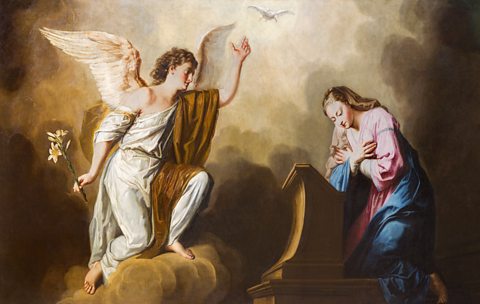The message to Mary about Jesus' birth (Luke 1:26-38)
Summary
God sent the angel Gabriel to Nazareth with a message for Mary, who was promised in marriage to Joseph. The angel told Mary that she would have a son, whom she was to name Jesus. The angel said, âHe will be great and will be called the Son of the Most High God.â
Mary asked how this could be as she was a virgin. The angel answered, âThe Holy Spirit will come on you, and Godâs power will rest on you.â He also told Mary that her elderly relative Elizabeth was six months pregnant, for there is nothing that God cannot do. Mary replied, âI am the Lordâs servantâ.

Background
When MatthewA writer of one of the four gospels in the New Testament. and LukeA writer of one of the four gospels in the New Testament. wrote their gospels they did so independently, using different sources and eyewitnesses. They also came from different backgrounds.
Matthew was a Jew who became a Christian. He was familiar with the Old TestamentThe first part of the Christian Bible which corresponds to the Hebrew Bible but is arranged differently. and keen to show how Jesus has fulfilled prophecies about the Messiah.
Luke, on the other hand, was a Gentile (non-Jew) who wanted to show that Jesus was saviour for all humankind. Luke also shows a special interest in women and marginalised people (eg social outcasts, the poor, tax collectors). The particular interests of Matthew and Luke are shown in the way they write.
Mary holds a special place in the Christian faith as the mother of Jesus. This is highlighted in particular by the Roman Catholic Church which believes that Mary is blessed with some special characteristics:
- She is given the title Mother of God.
- Mary herself was conceived free from original sin and was therefore perfect, this is known as the Immaculate Conception.
- A perpetual virgin â after giving birth to Jesus, Mary had no more children and remained pure.
- Mary did not die a normal, physical death but was taken up to heaven in bodily form, this is known as the Assumption
Understanding the text
Mary is the focus of Lukeâs account as the angel tells her (rather than Joseph) about the child she will give birth to. We learn about Maryâs character â the angel tells her âYou have found favour with Godâ and Mary shows her obedience to Godâs wishes by saying âI am the Lordâs servantâ. When Mary accepted what God wanted she was taking a great risk. She would probably have to face public shame and perhaps Joseph would be angry. Yet Mary did not doubt the angelâs message and gave her acceptance.
Luke does not quote from the Old Testament as Matthew does. However, he agrees that the child to be born will be Godâs son and the promised saviour. This is shown in the following ways in Lukeâs account:
- The angel refers to the child as âthe son of the Most Highâ and âthe Son of Godâ.
- The angel also says âThe Lord will give him the throne of his father Davidâ. It was expected that the Messiah would be from King DavidThe second king of the Israelite monarchy, usually dated to the 11th to 10th century BCE. He established Jerusalem as the capital city. family line.
- The angel says of Jesus âhis kingdom will never endâ. In the Old Testament, this promise was made to King David. Jesusâ kingdom, however, will be more than just a political or geographical area. It will be a spiritual kingdom.
- Luke agrees that Mary will be a virgin when the child is born and that his conception will be through the power of the Holy SpiritThe third element of the 'Trinity' (God is the Father, the Son and the Holy Spirit). The Holy Spirit is active as God's presence and power in the world..